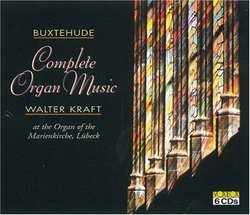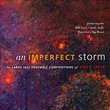| All Artists: Dietrich Buxtehude, Walter Kraft Title: Buxtehude: Complete Organ Music Members Wishing: 0 Total Copies: 0 Label: Vox (Classical) Release Date: 10/26/2004 Album Type: Box set Genre: Classical Styles: Opera & Classical Vocal, Chamber Music, Forms & Genres, Sonatas, Variations, Historical Periods, Baroque (c.1600-1750), Classical (c.1770-1830), Modern, 20th, & 21st Century Number of Discs: 6 SwapaCD Credits: 6 UPC: 047163361326 |
Search - Dietrich Buxtehude, Walter Kraft :: Buxtehude: Complete Organ Music
CD DetailsSimilar CDs |
CD ReviewsBEAUTIFUL AS WELL AS REFERENCE L. E. Roberts | Escondido, CA | 03/25/2008 (5 out of 5 stars) "As one completely devoted to the organ works of Bach (and of others), I highly recommend this recording. I have loved Buxtehude's organ works for many years, and had certain recordings on LP (old Mercury Living Presence of Alf Linder and the LP of Walcha's "Orfelmeister vor Bach,") which are my favorites. Neither, however, is available on CD. While Walter Kraft is not Helmut Walcha or Alf Linder (an objective observation, not a qualitative one), he is not an average, or even a good organist. He is a superb organist. Listening to this album not only brought me back to organ music that I love, it introduced me to someone who plays it differently (not worse) than those I was familiar with. I knew Walter Kraft's playing from some Bach LP's I have hidden away in my multitude of old recordings. I prefer Walcha and Karl Richter for Bach, which does not mean that I will throw away any Jeanne Demessieux, E. Power Biggs, or Simon Preston recordings I have, let alone my Schweitzer LP's. This album is not only the best recording available of all Buxtehude's organ music, it stands by itself due to the virtuosity of Mr. Kraft. It is great music, well played, and eminently listenable." A Fundamental S. Roberto Barocio Delgado | MEXICO, D.F. Mexico | 03/29/2007 (4 out of 5 stars) "Not always have we got a clear notion as to the extent in which Buxtehude influenced the work of J.S. Bach. Neither is a Buxtehude's full collection available in just one album at such an accesible price. This is an impeccable remasterisation of a celebrated performance of Walter Kraft on the Lubeck Cathedral organ: an instrument very similar to those Buxtehude wrote for." Die Orgelwerke Buxtehudes minus 2 David G. Lebut Jr. | Gilbert, AZ USA | 07/07/2006 (5 out of 5 stars) "This is by far (with the exception of the set performed by Harald Vogel) the best recording of Buxtehude's complete output for Organ. With two exceptions (not included in this recording are the Praeludium C-Dur BuxWV 138 and the Kanzonette a-Moll BuxWV 225), Walter Kraft here records the entire opus for Organ of his illustrious predecessor at the post of Organist and the Marienkirche zu Luebeck--the Danish/German Organist Dietrich Buxtehude."
|




